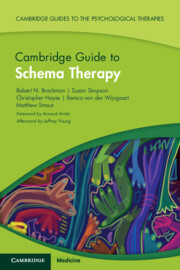Book contents
- Cambridge Guide to Schema Therapy
- Cambridge Guides to the Psychological Therapies
- Reviews
- Cambridge Guide to Schema Therapy
- Copyright page
- Contents
- Foreword
- Preface
- A Note from the Series Editor
- Acknowledgements
- Part I Overview of the Schema Therapy Model
- Part II The Model of Schema Therapy in Practice
- Part III Applications and Adaptations for Mental Health Presentations
- Part IV Application of Schema Therapy in Different Populations and in Different Settings
- Chapter 16 Schema Therapy for Forensic Populations
- Chapter 17 Group Schema Therapy
- Chapter 18 Schema Therapy for the Schema Therapist
- Chapter 19 Supervision and the Supervisory Relationship in Schema Therapy
- Chapter 20 Schema Therapy in the Online World
- Epilogue Continuing the Journey
- Afterword from Jeffrey Young, PhD, Founder of Schema Therapy
- Appendix Interview Questions/Guidance for the Assessment Process (Chapter 3)
- Index
Epilogue - Continuing the Journey
from Part IV - Application of Schema Therapy in Different Populations and in Different Settings
Published online by Cambridge University Press: 27 July 2023
- Cambridge Guide to Schema Therapy
- Cambridge Guides to the Psychological Therapies
- Reviews
- Cambridge Guide to Schema Therapy
- Copyright page
- Contents
- Foreword
- Preface
- A Note from the Series Editor
- Acknowledgements
- Part I Overview of the Schema Therapy Model
- Part II The Model of Schema Therapy in Practice
- Part III Applications and Adaptations for Mental Health Presentations
- Part IV Application of Schema Therapy in Different Populations and in Different Settings
- Chapter 16 Schema Therapy for Forensic Populations
- Chapter 17 Group Schema Therapy
- Chapter 18 Schema Therapy for the Schema Therapist
- Chapter 19 Supervision and the Supervisory Relationship in Schema Therapy
- Chapter 20 Schema Therapy in the Online World
- Epilogue Continuing the Journey
- Afterword from Jeffrey Young, PhD, Founder of Schema Therapy
- Appendix Interview Questions/Guidance for the Assessment Process (Chapter 3)
- Index
Summary
The recent surge in research evidence supporting the efficacy of schema therapy has led to exponential interest in this model by therapists across the globe. Schema therapy is becoming increasingly applied to a wide range of clinical populations, including adults, children, and families with personality-related difficulties, chronic mood disorders, complex trauma, addictions, eating disorders, forensic settings, and relationship difficulties. Randomised controlled trials have supported its effectiveness with borderline and Cluster C personality disorders, forensic populations, and eating disorders, in individual and group settings.
The International Society of Schema Therapy (ISST) was founded in 2008, and now has over 2,500 members from more than sixty countries worldwide. Further, more than 100 schema therapy training programmes are now operating, increasing accessibility and applicability to a wide range of global cultures and languages.
- Type
- Chapter
- Information
- Cambridge Guide to Schema Therapy , pp. 342 - 343Publisher: Cambridge University PressPrint publication year: 2023

